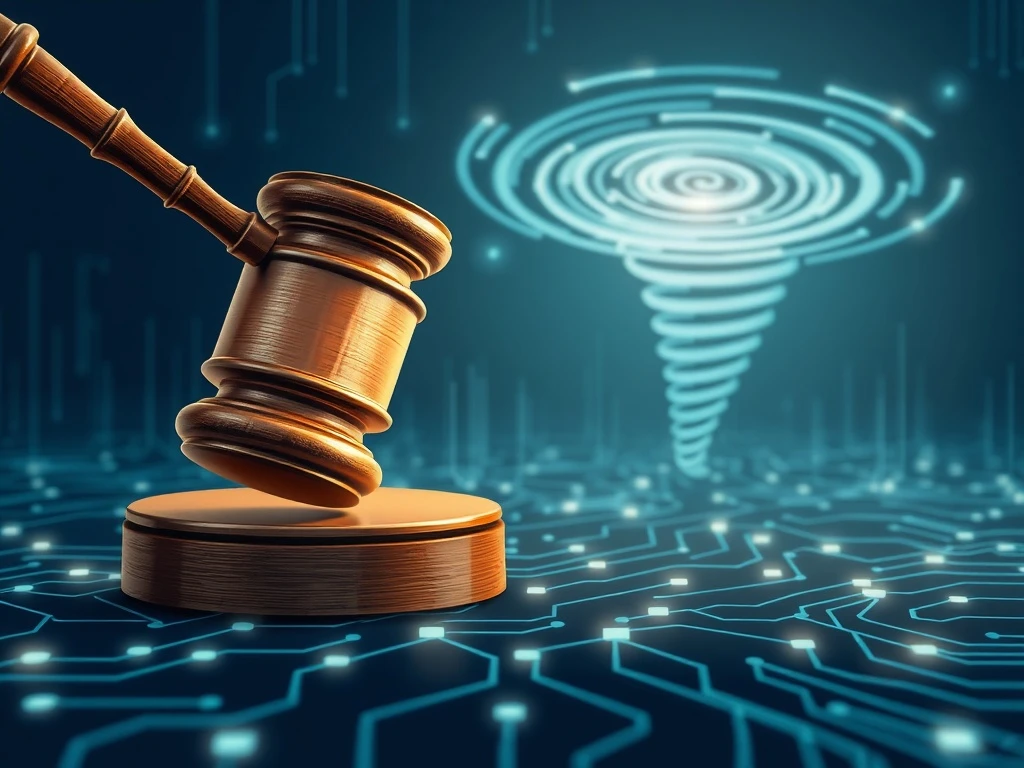Tornado Cash Trial: Jury Gridlock Sparks Crucial Developer Liability Debate

The **Tornado Cash trial** has reached a dramatic impasse. After four days of intense deliberation, the jury remains deadlocked on key charges. This critical development highlights the immense stakes involved for the cryptocurrency industry. It specifically impacts the ongoing debate surrounding the legal responsibilities of software developers in decentralized systems. The outcome of this case could reshape the future of open-source development and privacy tools within the blockchain space.
**Tornado Cash Trial** in Focus: The Deadlock
Jurors in the Roman Storm trial recently informed the court of their continued inability to reach a unanimous verdict. This announcement followed extensive deliberations. The situation prompted Judge Katherine Polk Failla to issue an Allen charge. This legal instruction aims to encourage further discussion among a deadlocked jury. It urges jurors to re-examine their positions and strive for consensus. However, this move has also brought the deep divisions within the jury to light.
Significantly, Storm’s lawyer, Brian Klein, voiced strong opposition to the charge. Klein argued that the jury had already clearly indicated a unanimous verdict was unlikely. He instead urged the court to consider accepting a partial verdict. Conversely, prosecutors preferred to push for continued deliberations. Assistant US Attorney Thane Arad stated, “Let’s cross that bridge when we get there.” The judge ultimately sided with the prosecution. This decision keeps the trial alive, thus delaying a potential mistrial. Consequently, the legal battle over crypto developer responsibilities continues.
**Allen Charge** Explained: A Legal Maneuver
An Allen charge, sometimes known as a “dynamite charge,” serves as a powerful judicial tool. Judges use it when a jury reports an impasse. The instruction essentially asks jurors to reconsider their viewpoints. It encourages them to listen carefully to fellow jurors’ arguments. The goal is always to reach a unanimous decision. However, critics argue that such a charge can coerce jurors into abandoning their convictions. They believe it might push them towards a verdict they do not truly support. This specific application in the **Tornado Cash trial** underscores the complexity of the case. It also highlights the court’s desire for a definitive resolution.
Historically, Allen charges have been a subject of debate. They aim to prevent costly retrials and ensure judicial efficiency. Nevertheless, concerns persist about their potential impact on juror independence. In this high-profile crypto case, the charge carries added weight. It reflects the judiciary’s struggle to navigate novel legal questions posed by decentralized technologies. Therefore, its use here is particularly noteworthy for legal observers and the crypto community alike.
The Core Conflict: **Crypto Developer Liability**
At the heart of the Roman Storm case lies a fundamental question: when are software developers liable for the misuse of their creations? Roman Storm, a co-founder of the Ethereum-based mixer Tornado Cash, faces accusations. Prosecutors claim he conspired to launder over $1 billion in illicit funds. This amount reportedly includes money linked to North Korea’s notorious Lazarus Group. The government contends that Storm actively promoted the tool to criminals. They further allege he ignored warnings about its potential for misuse. This stance directly challenges the long-held principle of open-source software development.
Conversely, the defense argues that Storm merely wrote open-source code. They assert he had no control over how others used it. This argument raises profound questions about liability boundaries for developers. In traditional software, developers often maintain control or ownership. Decentralized systems, however, operate differently. Once code is released, it becomes public. It can be used by anyone, often without central oversight. Consequently, this trial could establish a significant precedent. It might redefine the legal framework for open-source contributions in the blockchain era. Therefore, the verdict carries immense weight for developers worldwide.
Roman Storm’s Defense and Prosecution’s Stance
The prosecution’s case against **Roman Storm** hinges on proving intent and active participation. They argue that Storm’s actions went beyond simply writing code. They claim he facilitated criminal activity. Evidence presented includes communications and promotional efforts. These allegedly demonstrated an awareness of Tornado Cash’s illicit uses. The government emphasizes the mixer’s role in obfuscating transactions for sanctioned entities. This includes, specifically, the Lazarus Group. Their argument seeks to establish a direct link between Storm’s actions and the laundering of funds.
Conversely, the defense paints a picture of a developer creating a privacy tool. They maintain Storm adhered to the principles of open-source development. His legal team argues that the code, once deployed, operated autonomously. They contend that holding developers responsible for the actions of malicious actors is unfair. Such a precedent, they suggest, could stifle innovation. It might also discourage the creation of vital privacy-enhancing technologies. Furthermore, they highlight the technical limitations of controlling a decentralized protocol. The defense aims to separate the act of writing code from the subsequent misuse by third parties. This distinction is crucial for the future of decentralized applications.
Implications for **Decentralized Software** and Beyond
The **Tornado Cash trial** extends far beyond Roman Storm’s individual fate. Its outcome will undeniably shape the landscape for all **decentralized software**. A conviction could establish a dangerous precedent. It might hold developers criminally liable for the unintended uses of their open-source code. This could lead to a chilling effect on innovation. Developers might become hesitant to contribute to privacy-preserving tools. They might also shy away from other decentralized applications. Such a scenario could significantly impede the growth of Web3. It could also curtail advancements in financial privacy.
Conversely, an acquittal could provide much-needed clarity. It might reinforce the principle that code is speech. It could also affirm that developers are not inherently responsible for external misuse. This would empower innovators to continue building decentralized solutions. The case therefore highlights a critical tension. It balances national security concerns against the principles of open-source development and privacy. The entire blockchain industry watches closely. They understand the profound impact this verdict will have on the future direction of decentralized technology. Ultimately, the trial’s resolution will help define the legal boundaries of digital autonomy.
Broader Regulatory Echoes and Future Outlook
The Roman Storm trial is not an isolated event. It reflects a broader global push for stricter cryptocurrency regulation. Governments worldwide are grappling with how to oversee decentralized finance (DeFi) and privacy tools. This case serves as a test of existing legal frameworks. It also reveals the challenges in applying traditional laws to novel technologies. The verdict could influence future regulatory approaches to blockchain. It might also impact how law enforcement agencies pursue similar cases. The implications extend to stablecoin regulation and other digital asset policies. Regulatory bodies are keen to assert control over the crypto space. They aim to prevent illicit activities while fostering innovation.
Should Storm be convicted on all counts, he could face severe penalties. The maximum sentence is up to 45 years in prison. This potential outcome underscores the gravity of the charges. It also highlights the government’s determination to prosecute alleged crypto-related crimes. The trial’s conclusion, whether through a verdict or a mistrial, will mark a pivotal moment. It will provide crucial insights into the legal future of decentralized systems. The crypto community awaits the final decision with bated breath. This verdict will undoubtedly set a significant benchmark for developer responsibilities moving forward.









